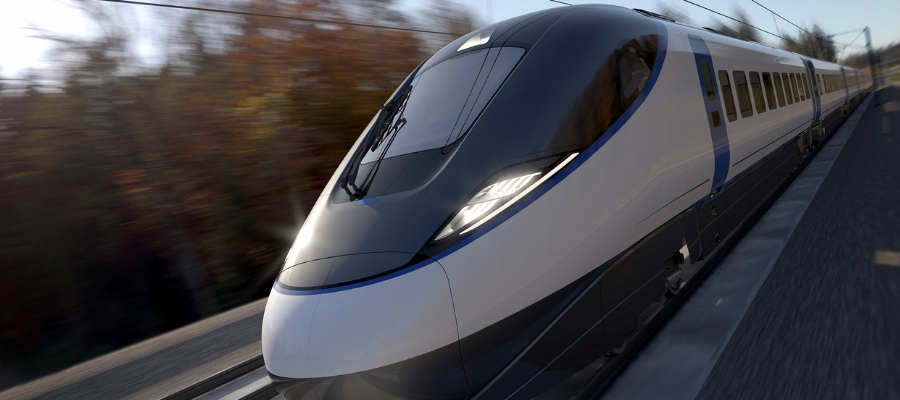🕒 Article read time: 2 minutes
HS2 to be powered by zero carbon energy from day one, minister claims

Andrew Stephenson MP, the Minister of State for Transport responsible for HS2, has committed to powering Britain’s new high-speed trains with zero carbon energy from their first day of operation to support the government’s goal to make HS2 net zero from 2035.
As part of its ambitious drive to make the project net zero carbon from 2035, HS2 Ltd plans to make construction sites diesel-free by 2029 and halve emissions from the steel and concrete used to build the railway by 2030.
VITAL STEP TOWARDS ACHIEVING CLEANER UK TRAVEL
“We know that the climate crisis demands urgent action and these commitments from HS2 are vital steps towards achieving cleaner UK travel,” said Stephenson.
Describing the project as a “once-in-a-lifetime investment”, the minister said that as the country’s biggest infrastructure project, the government wanted to ensure it was underpinned by its ambitions for a greener transport and construction future.
PLAN SETS OUT HOW TO ACHIEVE CARBON MILESTONES
HS2 published its Net Zero Carbon Plan earlier this week (11 January 2022), which sets out how it will achieve new carbon reduction milestones, support the decarbonisation of the UK construction sector and reduce the carbon footprint of the programme.
Major new targets include aiming for diesel-free construction sites by 2029, with the first one expected in 2022. Carbon emissions from steel and concrete will be reduced by 50% by 2030 compared with 2021 levels. To help achieve this, HS2 is collaborating with research organisations to accelerate innovation in low carbon technologies, such as alternative fuels and renewable energy.
CLIMATE SCIENCE INFORMS ALL AREAS OF WORK
HS2 CEO Mark Thurston maintains that HS2 Ltd is completely committed to reducing its carbon emissions as it designs, builds and operates the new railway.
“We’ve ensured that tackling climate change is an essential feature of all areas of our work – in design, in early works, and throughout major construction, allowing the project to build towards net zero from 2035,” he said.
“The new targets announced today demonstrate the significant role HS2 will play in addressing the climate challenge, by providing a low carbon, long-distance transport solution and leading the construction sector to drive down carbon emissions.”
HS2 Ltd has pledged to reducing carbon emissions as much as possible from 2035. For emissions that cannot be eliminated, the company has committed to use natural or technological methods, known as carbon offsetting. This will remove the same level of emissions that are produced as it builds, maintains and operates HS2.
A COMPREHENSIVE RANGE OF MEASURES
The company will work towards being carbon zero from 2035 by adopting a wide range of targets. These include using 100% zero carbon electricity generation to power its trains, introducing the first diesel-free site in 2022, and working with supply chain partners to tackle carbon emission ‘hotspots’ each year HS2 is built.
The company will also be investing in innovation to speed up ways to cut emissions in HS2’s supply chain, cutting emissions from sources it owns or controls and offsetting residual emissions by looking at ways to capture and store carbon emissions using nature-based interventions such as planting new trees to absorb carbon dioxide.
HS2 is working with supply chain and research organisations to pilot and implement low carbon materials, alternative fuels, renewable energy and new construction methods through the HS2 Innovation programme. The 32 projects across the programme are projected to achieve savings of 1.6 million tonnes of carbon emissions.
Michelle Gardner, Head of Public Policy and decarbonisation lead at Logistics UK, said: “HS2 is the UK’s biggest transport infrastructure project for a generation. The company’s ambitious approach to ensuring that the design and build of the scheme emits as few emissions as possible is wide-ranging and comprehensive. But what really impresses is its commitment to using 100% zero carbon electricity generation to power its trains from day one. This raises the bar for future transport projects and shows what is possible given the right level of ambition and determination.”
*www.logistics.org.uk/rail
Published On: 13/01/2022 16:00:30

Comments Section
If you are a Logistics UK member login to add comments.